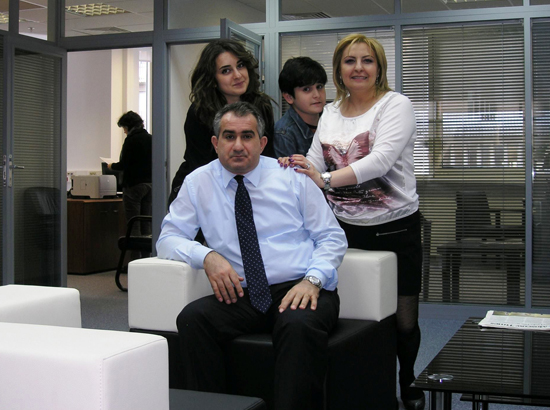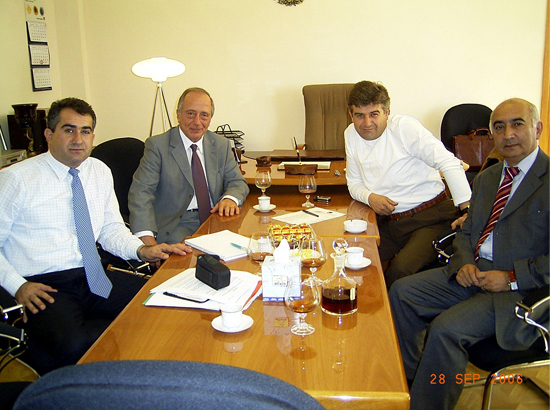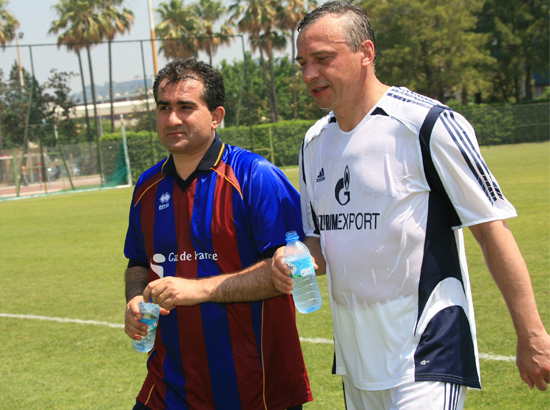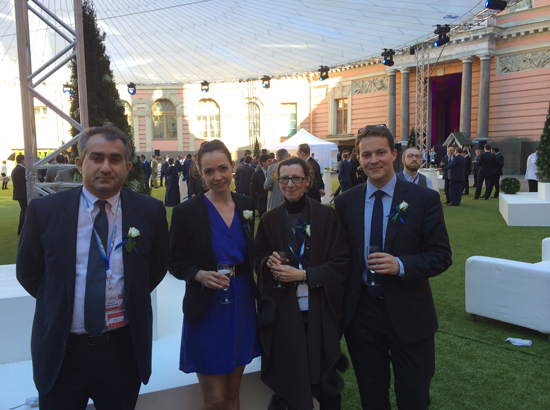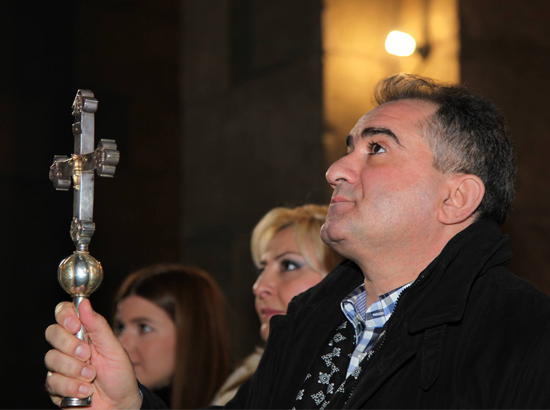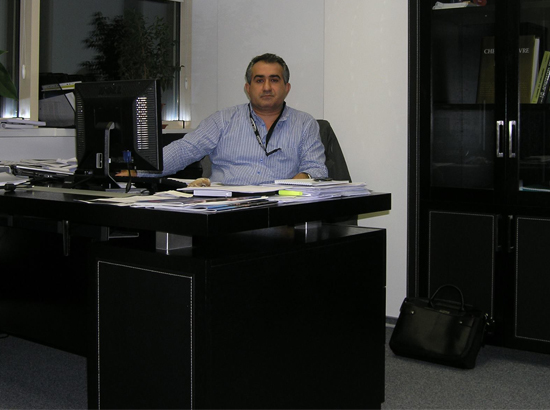Albert Grigoryan, General Representative of GDF SUEZ in Russia and Ukraine, head of representations in Moscow and Kiev - is the next hero of Mediamax’s 50 Global Armenians special project.
Albert Grigoryan was born in Yerevan in 1971. He left his school with a gold medal. He graduated from Gladzor Institute in Yerevan. In 1997, he entered the Department of Political Science of Panthéon-Assas University in Paris. In 1999, Albert Grigoryan started working in Gaz de France (currently GDF SUEZ). Since August 2012, Albert has been appointed the General Representative of the company in Russia and Ukraine. In April 2014, he was elected Vice President of Energy Committee of Association of European Businesses in Russia.
I was born into an ordinary Armenian family in Yerevan in 1971. My parents were born in Iran and settled in Armenia in 1946. I left N92 School with a gold medal in Yerevan. I started taking French and Russian classes at school.
Football is my main hobby. At 9-17, I played football on quite a professional level but later I consciously chose education and career. My coach was legendary ''Ararat 73'' goalkeeper Alesha Abrahamyan. He taught me that one should feel the victory in mind long before going to the field. He didn't mean only football but also life on the whole. He was one of the people who taught me not to get envious of the achievements of the others but instead, to understand if someone managed to do it, then you can also achieve it. Many years later I met him in Yerevan and I thanked him for his advice.
I have been interested in history, geography and policy since childhood and I was eager to become a diplomat. So, after leaving school I decided to set off to Moscow to enter MGIMO; my family was surprised by my decision. It was in 1989. Only 4 Armenian students could study there upon the “national quota”. But after the Spitak earthquake, Armenia was granted an extra quota for 10 more places. I successfully passed all the necessary exams but I wasn't admitted because of political reasons: I criticized the 27th Congress of the Communist Party and the commission decided to count me out hinting that I chose a wrong profession and the one who wanted to serve the state should not criticize it.
Many years later, Albert Grigoryan was invited to conduct a master class for students as a Director of the GDF-Suez French gas company. Albert himself calls it an irony of fate and confesses he'd had many such episodes in his life. 
At Moscow office of GDF SUEZ, 2013
Photo: from A. Grigoryan's archive
After that I returned to Yerevan and told my parents that I was going to work at a building site. My father, who was a driver of a truck and who became a worker after the heart attack, always earned money by sweat and blood and I saw it day in day out. The parents have always been my best role model and I inherited many things from them, for instance, the ability to face problems.
Having worked for a year, I applied for the Department of Oriental Studies of Yerevan State University. As I had a gold medal, the minimum admission grades were lower for me than they were for others. I did well in the dictation in Armenian language, history and French and I had to take Armenian language and literature test. Alas, I couldn't think - or perhaps act- the way unwritten Soviet rules required which implied a bribe or need for “putting in a word” for me. It was a hard blow for a 19-year-old teenager that I was at that time. I really believed that my family was right and everything wasn't so easy as I imagined.
I entered the Department of International Relations at Gladzor private university. I decided: I'd better study at a private university and pay for my studies and at the same time demand high-quality education from lecturers. I had brilliant lecturers - Hakob Hakobyan, Albert Mkrtchyan, Garik Hovhannisyan and other famous professors. This is where I met my future wife and studied with former Minister of Justice Hrayr Tovmasyan and Armenia's Permanent Representative of Armenia to the Council of Europe Armen Papikyan. I graduated from my university with honors diploma in 1995.
As only state universities granted an army respite at that time, during my studies I also served in the army in the years of war - in the internal troops - and my father was so much proud of me for this. At the same time, I didn't stop studying as I was given a chance to take the exams without attending lectures.
After graduating from the university, I faced a tough period in my life. I was married and I had to earn money for affording a family. It was hard to find a job, salaries were low and my diploma of a private university didn't let me be employed as many people first of all looked at my diploma and closed doors before me. As a result, I started working in the internal affairs system.
With Karen Karapetyan and other partners, 2006
Photo: from A. Grigoryan's archive
One of my relatives was a very good French specialist and worked in EU-funded TACIS project. In May 1996, I was offered to move to a vacancy of a manager in the project's representation. I started working with Belgians and French, at the same time improving my French. I felt good until one of the employers moved to study in France - a country which has always attracted me. Once she called to the office to talk to one of her friends. I was around and asked to tell her that one day I would also go to study in France. In reply to my half-serious and half-humorous remark, she told me not to ''talk a lot as only a few can make it''. Of course, it hurt my dignity and I decided that I would do my best to reach my goal. I started paying attention to available programs and writing letters. I sent my documents to six French universities and got positive responses from all of them. The hardest thing was to find funding but I managed to do it with the help of my family and relatives.
Though Albert already had a 10-month-old daughter he gave up the chosen path and left for France to start his studies.
Apparently, when I cast a glance to the past I realize that it was a crazy decision, since I had no relatives in France and I did not even have it clear where exactly I will go and where I will live. Perhaps, if I did realize it back then, I would not have dared it. But I really wanted to study, and I also wanted to know and learn about what Europe is. I wanted to prove to myself that despite the negative practice I had in case of the previous institute I can still study at a high-class one. What I wanted was to realize myself, gain skills and an opportunity to employ them. In the end, I chose the Faculty of Political Science at the University of Paris since France used to equate to only Paris for me. In a twist of fate, I applied to the same university as the girl who had challenged me saying that studying in France is not for everyone. I was planning to leave for a year and return to my family, but it happened otherwise.
At first, everything was really hard. I had to live in the university city for a year limiting myself to everything and hardly managing to make both ends meet. Obviously, I did not tell my family anything, not to give them another reason for concerns.
Other than daily challenges, I also had language related difficulties as my basis proved to be insufficient for effective studies. I spent several months “clung” to books and dictionaries and learned everything I could. In the end, I reached the level at which I started thinking in French. After defending my thesis on “Energy Programs in the South Caucasus”, my professor recommended continuing studies at doctoral level. I agreed but then I realized I won’t manage it as I had to make money and think of how to bring my family to France. As a result, having the most part of my work written I did not complete it at the end; my professor never forgave me that.
During my studies I used to continuously change my work. I worked as a custodian at an artificial football field established in Paris for especially 1998 Championship, then in an atelier, and used to earn additionally week after week until I met a compatriot – an Armenian emigrant who offered me a job at a knitwear shop providing that I forgot about diplomas and committed myself to sweater ironing. I worked there six months and along with that I used to send letters to various enterprises for the review of my candidacy. In the end, on June 1, 1999, I was invited for a probation period to Gaz de France within a contract with the university.
Owing to the support of my friends I twice managed to temporarily bring my family to France. But then we had to depart as their illegal stay in France was unacceptable for me. In 2000 I applied to French authorities with a request to reunite with my family and to get French citizenship and since 2002 my family is with me. We were all granted French citizenship in March, 2003.
Albert Grigoryan in his GDF SUEZ Moscow office with family.
Photo: from A. Grigoryan's archive
As to my career in Gaz de France, after my 6-month probation period completed I was offered to prolong it for three more months with a possibility of concluding an employment contract for a year. After the temporary contract they signed another contract with me with an indefinite period of time, and after I got citizenship in 2003 specific conditions of a state enterprise employee holding a special status started to apply to me. As a result, I assumed responsibility for the projects within Russia-CIS (Russia, Ukraine, Transcaucasia and Central Asian countries) area, and later I became chief-negotiator and manager of Russian contracts.
During his visit to France in 2012, Armenian President Serzh Sargsyan said: “We are proud that around 500 000 Armenians reside in France and that many of them have had their active contribution to the development of France. They are equally Armenians and French. They love Armenia and France to the same extent”. These words fully apply to Albert who says he has not renounced his Armenian citizenship, but at that, is grateful to France for granting him an opportunity to realize himself and admits feeling equally good when walking in the streets of Armenia and Paris.
During my work at the company I was lucky to be involved in a number of projects and events. I was featured in Jacques Chirac’s delegation during his visit to Armenia in 2006. In 2007-2008, I was actively involved in the organization works of football matches between the representatives of GDF SUEZ, Gazprom Export and ArmRosGazprom, including in Yerevan too. I was also one of the EU observers at Russian-Ukrainian gas crisis in Moscow in January, 2009. 
In Monaco, after football match between GDF SUEZ and Gazprom Export
Photo: from A. Grigoryan’s archive
In 2012, there was a vacancy of Director of GDF SUEZ representation in Moscow. After 7 years of working with Russian partners, I already felt confident enough to compete for the post. I successfully passed 6 rounds of interview and was appointed to the post of the General Representative and Head of Representation and I’ve been holding the post since then. It’s quite an interesting and fascinating job like that of an ambassador. It involves organization of the representation’s operation in Moscow and Kiev, meeting and negotiating with representatives of various power structures, enterprises, Russia’s and Ukraine’s leadership. I have never thought I will represent France in a foreign country. Another paradox in my fate: as a child and a young man, I dreamed of representing Armenia and was the Ambassador of our country in France but it happened the way it did.
Albert admits that starting from the very first years of his reunion with the family he annually brings his children to Armenia as he thinks they should perfectly master both French and Armenian and know and understand Armenia from within.
Gazprombank’s reception, Saint-Petersburg, 2014
Photo: from A. Grigoryan’s archive
I have published articles in local editions on various issues in France and addressed my constructive criticism to the Armenian Diaspora in France and Armenia. I think my close ties with Armenia, life and work experience in France as well as my “cosmopolitism” give me the right to speak freely and constructively on all issues related to Diaspora and Armenia.
I think the Armenian state is the backbone of the Armenian nation and should again become the center of gravity and strategic decision-making for all Armenian structures. The task is very hard and long-term yet quite feasible.
I consider lack of trust the major problem in Armenia. Young people don’t trust the country’s leadership and the trust crisis underlies the modern demographic crisis in my view. As they don’t see prospects for the country they live in they seek other places for self-fulfillment. If the young people are sure they will be able to find a normal job upon graduation, if they see prospects and if they have confidence the power can be changed through elections and that laws are enforced, the atmosphere in the country will change. When we had the confidence, we managed to return Karabakh. Now we need economic and diplomatic victories.
In the church
Photo: from A. Grigoryan’s archive
I am like many Armenians scattered all over the world - with their hearts still in Armenia where they were born, and minds belonging to France - the country which received me - yet I live in a “foreign trip” in Russia. Some people think that my story is a typical success story but I don’t think so. I’ve had a tough fortune. My father died when I was young, I couldn’t enter the university I wanted to, and I had great difficulties at the beginning in France. I don’t consider it a success story - what I achieved is a result of hard and persistent efforts and I am thankful to the fate for the chances and lessons it gave me.
The stories I drew from my life experience are in fact simple - your steps should always be consistent and well-thought. Besides, you should be responsible for what you do, have the courage to make decisions and admit your errors and be accountable for them. You should tell yourself - there is nothing impossible in life and if others succeeded I will also do. Most importantly, you should know what you want from life, know your priorities at each stage of your life and stand firmly on the ground. The sum of all these efforts leads to success.
Aram Araratyan talked to Albert Grigoryan









